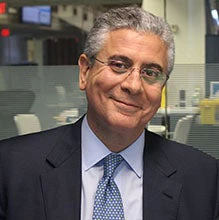
For Lebanon, more than 25% of the population is now Syrian. The ratio in Jordan is slightly less, but still enough to tax the economy and the social fabric. As the days go by with no sign of an end to conflict anytime soon, the issue of refugees is stretching the limits of generosity in Jordan and Lebanon and adding to their already daunting respective political and security issues. Just imagine the entire population of Mexico flocking into the United States in a matter of a couple of years. Just imagine 20 million people crossing the Mediterranean into southern Europe. Just imagine…
And the international community is still far behind in terms of helping these two countries that are paying a high cost for a crisis that is not of their own making, nor within their control. Just imagine if Lebanon and Jordan had chosen to shut their borders and leave millions of people crushed between an unforgiving conflict and a closed horizon.
The conflict in Syria has created significant development challenges for neighboring countries, not least because of the large movements of people seeking refuge from deadly violence, and from the rapid demographic changes caused by these shifts.
One could identify three phases in the international community’s approach to, and attempts to deal with, the impact of the Syrian crisis on the Mashreq region.
First, the world looked at the Syrian civil war and its repercussions from a purely humanitarian perspective, with little attention to the effect on neighboring countries. The UN system, in particular UNHCR, and bilateral donors engaged quickly with the Lebanese and Jordanian governments in addressing this initial challenge. Camps were set up, mainly in Jordan, and informal settlements were tolerated in Lebanon.
Then, the flows of refugees increased sharply, posing a security, humanitarian and developmental challenge to the host countries. The international community began talking about the necessary link between humanitarian aid and development support.. Instruments were put in place, such as the UN regional rapid-response plans, stabilization plans and road maps. Assessments were produced, the most telling of which is the landmark Bank-led Economic and Social Impact Assessment of the Syria Crisis on Lebanon. A document that served to shape the world consciousness about the plight of Lebanon.
On the financing side, the World Bank-managed, multi-donor trust fund for Lebanon, as well as emergency operations for Jordan, and other financing mechanisms were created to signal willingness to help the two countries tackle this external shock that is threatening their own development and reversing some of their achievements in health, education, water and sanitation.
Now, the situation on the ground has further evolved, and in a dramatic way. The realization is that there is no “day after”. There is no end in sight to the Syrian conflict. And there is no predictable time frame for when the refugees may return home. The only certainty is that Jordan and Lebanon find themselves responsible for both their own citizens and millions of refugees living alongside them. These countries and the world are looking at an unprecedented demographic shift that took Lebanon from a population of 4.2 million to about 5.5 million in the span of less than three years. The same, with a slightly varying magnitude, is true for Jordan.
It is this new situation that needs to be addressed with the utmost urgency, through new ways and new instruments. We are no longer talking about humanitarian actions or normal development support. We are looking at demographic transformation; economic and social challenges that can cause immense damage to these countries’ insufficient, but still real, development gains of the last 30 years. For Lebanon, because of the particular social equilibrium of the country, this stress could constitute an existential threat.
Implementing a development-led approach to mitigate the impact of the Syrian conflict has fallen short of needs given the limited financial support to host countries’ budgets. The Syrian conflict is now in its fifth year, and there is a strong understanding that its impacts also have to be addressed through development-led approaches. But the financing of these approaches has not been commensurate with the scale of the need, especially for Lebanon.
Humanitarian and development partners, including donors, have provided significantly more support for extra-budgetary spending for host countries. This certainly alleviates some of the development impacts on both host and refugee communities. It does not, however, directly help relieve the pressure on the countries’ national budgets.
It is quite clear that the financing needs of host countries are considerably beyond the means of Jordan and Lebanon: grant funding has been and will likely remain limited to a fraction of what is required. While traditional development funding is available at the needed scale, Syria’s middle-income neighbors are not eligible to borrow at the concessionary rates available to poorer countries.
It is indeed imperative, today, for all members of the international community as well as the multilateral donors to find creative ways of helping Lebanon and Jordan manage and absorb the economic and social stress caused by this unprecedented crisis. The World Bank needs to take a lead role in this drive.
If the world continues to let down host countries, the cost will be tremendous. Rather than helping pay for the global public good they are providing, the international community will have to settle the bill for the global ‘public bad’ that is certain to be the result of neglecting Jordan and Lebanon.


Join the Conversation